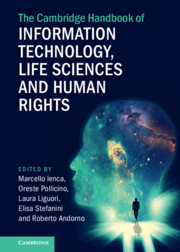Book contents
- The Cambridge Handbook of Information Technology, Life Sciences and Human Rights
- The Cambridge Handbook of Information Technology, Life Sciences and Human Rights
- Copyright page
- Contents
- Tables
- Contributors
- Acknowledgements
- Introduction
- Part I Life Sciences and Human Rights
- Part II Information and Communication Technologies and Human Rights
- 10 The Right to Internet Access
- 11 Face Recognition and the Right to Stay Anonymous
- 12 Artificial Intelligence and the Right to Algorithmic Transparency
- 13 Machine Learning, Cognitive Sovereignty and Data Protection Rights with Respect to Automated Decisions
- 14 Going Dark or Living Forever
- 15 Artificial Intelligence and Children’s Rights
- 16 Internet of Things Devices, Citizen Science Research and the Right to Science
- 17 Connected but Still Excluded?
- Part III Towards a Convergence
14 - Going Dark or Living Forever
The Right to Be Forgotten, Search Engines and Press Archives
from Part II - Information and Communication Technologies and Human Rights
Published online by Cambridge University Press: 17 May 2022
- The Cambridge Handbook of Information Technology, Life Sciences and Human Rights
- The Cambridge Handbook of Information Technology, Life Sciences and Human Rights
- Copyright page
- Contents
- Tables
- Contributors
- Acknowledgements
- Introduction
- Part I Life Sciences and Human Rights
- Part II Information and Communication Technologies and Human Rights
- 10 The Right to Internet Access
- 11 Face Recognition and the Right to Stay Anonymous
- 12 Artificial Intelligence and the Right to Algorithmic Transparency
- 13 Machine Learning, Cognitive Sovereignty and Data Protection Rights with Respect to Automated Decisions
- 14 Going Dark or Living Forever
- 15 Artificial Intelligence and Children’s Rights
- 16 Internet of Things Devices, Citizen Science Research and the Right to Science
- 17 Connected but Still Excluded?
- Part III Towards a Convergence
Summary
Since the CJEU’s ruling of May 2014 in the Google Spain case (also known as the Costeja case), the “right to be forgotten” on the internet has been hotly debated in Europe and beyond. The Court in Strasbourg has been reluctant so far in upholding erasure or anonymisation of news archives (or parts of them), but it suggested that ‘less restrictive measures’ might be tolerable. The latter arguably enables one to tailor approaches to what the balancing requires in individual cases.
Keywords
- Type
- Chapter
- Information
- Publisher: Cambridge University PressPrint publication year: 2022

